AWM41 1063 - [Nurses Narratives] Amy Eliza Wright
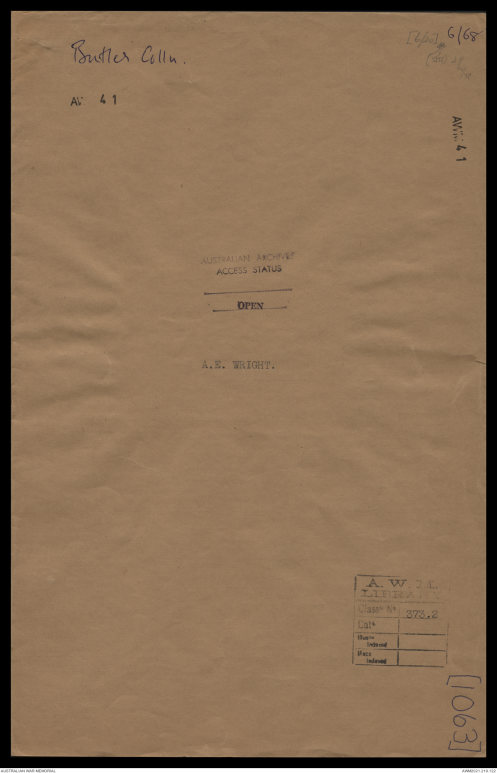
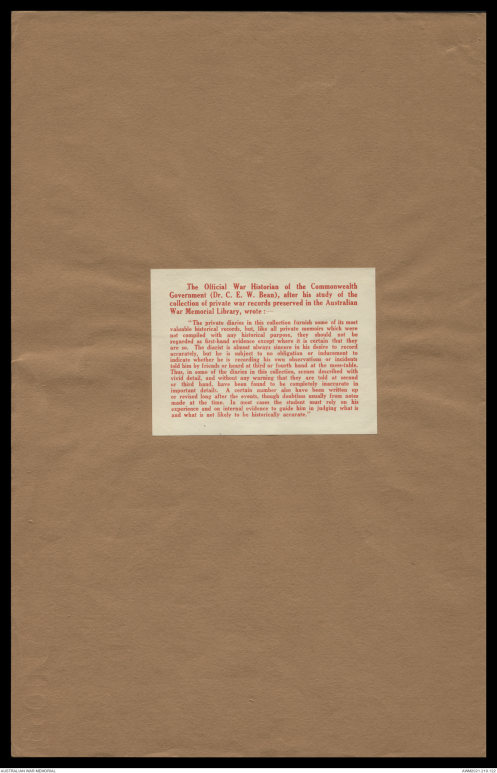
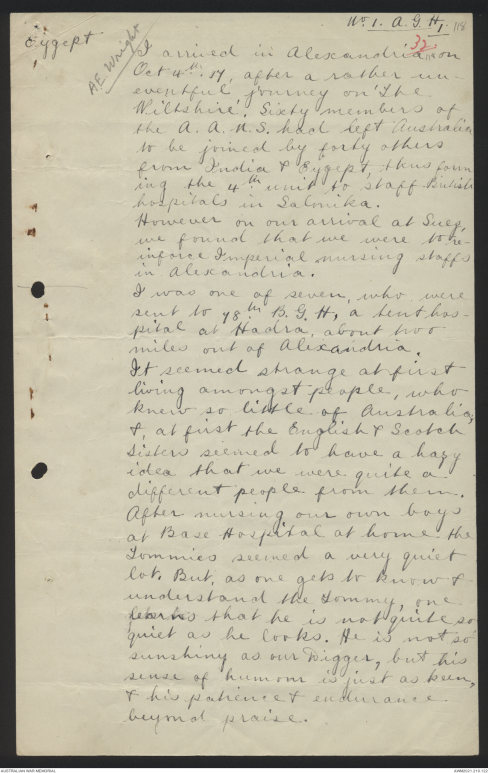
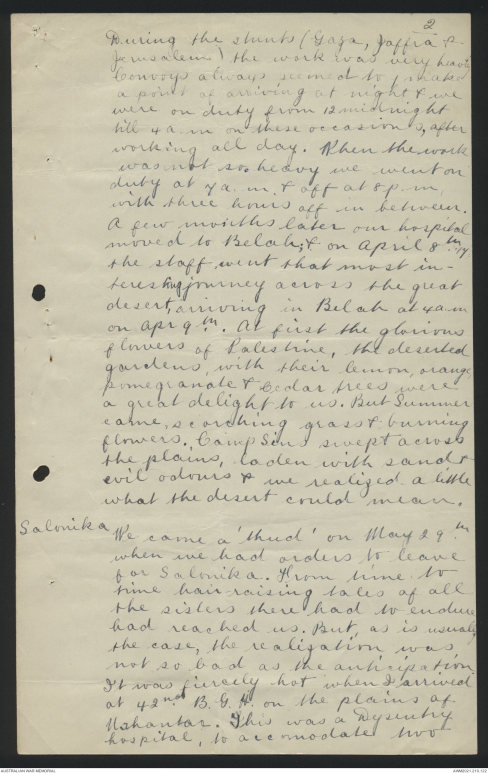
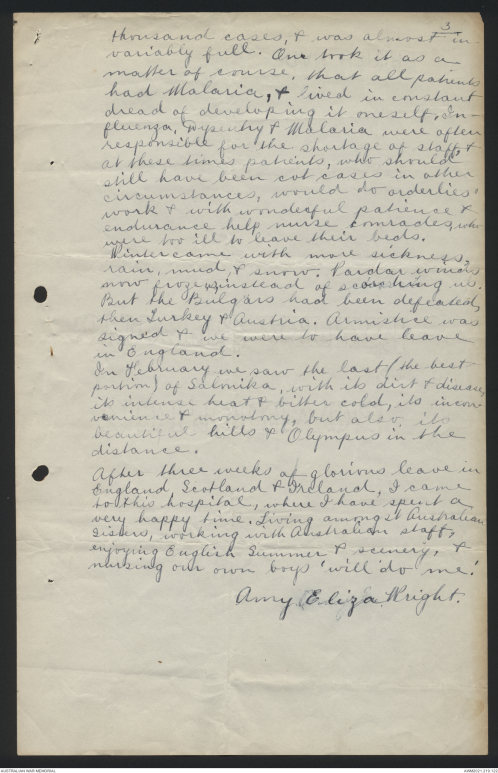
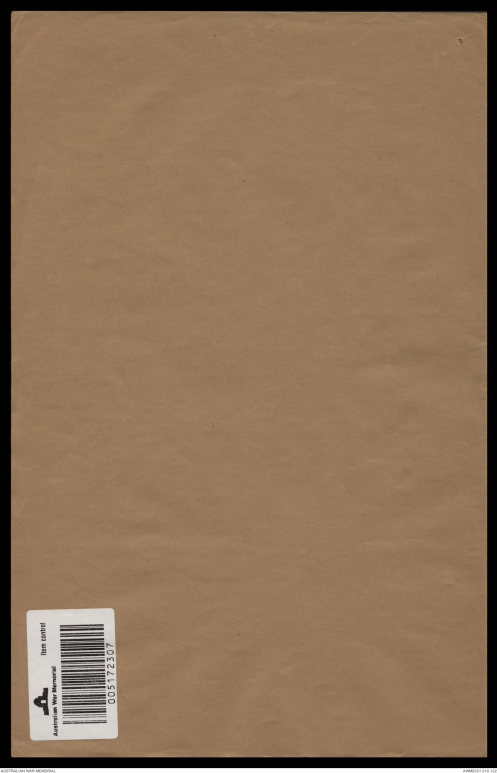
Butler Colln. 6/68
[6/20]
[[?]]
AW 41
AWM 41
AUSTRALIAN ARCHIVES
ACCESS STATUS
OPEN
A.E. WRIGHT.
A.W.M.
LIBRARY
Classn No 373.2
[1063]
The Official War Historian of the Commonwealth
Government (Dr. C. E. W. Bean), after his study of the
collection of private war records preserved in the Australian
War Memorial Library, wrote :-
"The private diaries in this collection furnish some of its most
valuable historical records, but, like all private memoirs which were
not compiled with any historical purpose, they should not be
regarded as first-hand evidence except where it is certain that they
are so. The diarist is almost always sincere in his desire to record
accurately, but he is subject to no obligation or inducement to
indicate whether he is recording his own observations or incidents
told him by friends or heard at third or fourth hand at the
mess-table.
Thus, in some of the diaries in this collection, scenes described with
vivid detail, and without any warning that they are told at second
or third hand, have been found to be completely inaccurate in
important details. A certain number have been written up
or revised long after the events, though doubtless usually from notes
made at the time. In most cases the student must rely on his
experience and on internal evidence to guide him in judging what is
and what is not likely to be historically accurate."
No. 1. A.G.H.
1 118
32.
Egypt
A.E. Wright
I arrived in Alexandria on
Oct 4th. 17, after a rather uneventful
journey on 'The
Wiltshire'. Sixty members of
the A.A.N.S. had left Australia
to be joined by forty others
from India & Egypt, thus forming
the 4th unit to staff British
hospitals in Salonika.
However on our arrival at Suez,
we found that we were to reinforce
Imperial nursing staffs
in Alexandria.
I was one of seven, who were
sent to 78th B.G.H, a tent hospital
at Hadra, about two
miles out of Alexandria.
It seemed strange at first
living amongst people, who
knew so little of Australia,
&, at first the English & Scotch
Sisters seemed to have a hazy
idea that we were quite a
different people from them.
After nursing our own boys
at Base Hospital at home the
Tommies seemed a very quiet
lot. But, as one gets to know &
understand the Tommy, one
learns that he is not quite so
quiet as he looks. He is not so
sunshiny as our Digger, but his
sense of humour is just as keen,
& his patience & endurance
beyond praise.
2
During the stunts (Gaza, Jaffra &
Jerusalem) the work was very heavy.
Convoys always seemed to make
a point of arriving at night & we
were on duty from 12 midnight
till 4 a.m on these occasions, after
working all day. When the work
was not so heavy we went on
duty at 7 a.m. & off at 8 p.m,
with three hours off in between.
A few months later our hospital
moved to Belah; & on April 8th 17
the staff went that most interesting
journey across the great
desert, arriving in Belah at 4 a.m
on Apr 9th. At first the glorious
flowers of Palestine, the deserted
gardens, with their lemon, orange,
pomegranate & cedar trees were
a great delight to us. But Summer
came, scorching grass & burning
flowers. Camp Sins swept across
the plains, laden with sand &
evil odours & we realized a little
what the desert could mean.
Salonika
We came a 'thud' on May 29th
when we had orders to leave
for Salonika. From time to
time hair raising tales of all
the sisters there had to endure
had reached us. But, as is usually
the case, the realization was
not so bad as the anticipation.
It was fiercely hot when I arrived
at 42nd B.G.H. on the plains of
Ushantar. This was a Dysentry
hospital, to accommodate two
3
thousand cases, & was almost invariably
full. One took it as a
matter of course, that all patients
had Malaria, & lived in constant
dread of developing it oneself. Influenza,
Dysentry & Malaria were often
responsible for the shortage of staff, &
at these times patients, who should
still have been cot cases in other
circumstances, would do orderlies'
work & with wonderful patience &
endurance help nurse comrades, who
were too ill to leave their beds.
Winter came with more sickness,
rain, mud & snow. Vardar winds
now froze us instead of scorching us.
But the Bulgars had been defeated,
then Turkey & Austria. Armistice was
signed & we were to have leave
in England.
In February we saw the last (the best
portion) of Salonika, with its dirt & disease,
its intense heat & bitter cold, its inconvenience
& monotony, but also its
beautiful hills & Olympus in the
distance.
After three weeks of glorious leave in
England, Scotland & Ireland, I came
to this hospital, where I have spent a
very happy time. Living amongst Australian
sisters, working with Australian staff,
enjoying English Summer & scenery, &
nursing our own boys 'will do me'.
Amy Eliza Wright.
Item control
Australian War Memorial
005172307
 Lulu B
Lulu BThis transcription item is now locked to you for editing. To release the lock either Save your changes or Cancel.
This lock will be automatically released after 60 minutes of inactivity.